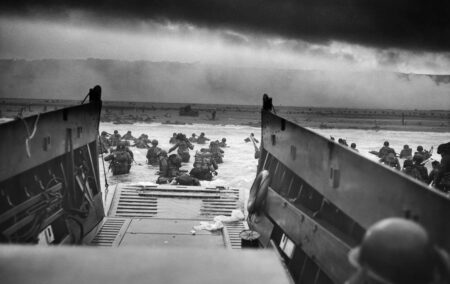The Allies made nonsense of the belief in the ‘ruthless efficiency’ of totalitarianism – capitalism smashed national socialism.
Many countries now free, and many hundreds of millions of people, owe their freedom to the D-Day landings on the beaches of France on 6 June 1945. The courage and efficiency of those who organised and fought in the Normandy invasions 75 years ago changed the world for the better and ended the prospects of a horrible tyranny all over Europe and beyond.
What lessons can we learn from D-Day? That free countries will always overcome unfree ones? Mainly, yes, but it’s not quite as simple as that. It seldom is.
On D-Day, the military forces of Britain and the United States, both free, democratic, capitalist countries, attacked the military forces of Germany, an unfree, totalitarian, national socialist country, which had occupied most of Western Europe. However, most of the German forces had been diverted from the West to the East to fight against Russia, another unfree, totalitarian country, this time communist. The fact that the Russians had turned the tide in the war against Germany aided the Allied invasion. The battles on the Eastern Front of the Second World War (WW2) constituted the largest military confrontation in history. Germany spent four-and-a half years fighting Russia, ultimately to be defeated. It is a disgrace that President Putin was not invited to the 75th Anniversary celebrations.
WW2 began because of a Non-Aggression Pact between Nazi Germany and communist Russia in August 1939. It was a pact between two socialist gangsters, Hitler and Stalin. Hitler, who personally named his party the National Socialist German Workers Party, was a radical socialist and a radical believer in what is now called ‘identity politics’. Although he didn’t kill nearly as many people as Stalin, his Holocaust of six million Jews and others is considered the worst crime in history. The pact gave Hitler a free hand in the West, and allowed him to conquer Western Europe without Russian intervention. Before this, they conquered Poland together.
The German army swiftly annihilated the armies of Belgium, the Netherlands and France, even though it was outnumbered and had inferior tanks. The British army was routed, but Hitler seemed to let it escape via Dunkirk, no doubt expecting the British to quit the war. They didn’t.
In June 1941, Hitler invaded Russia, in treacherous violation of the pact which Stalin had faithfully observed. At first the Germans ripped through the Russians, who were horribly weakened by Stalin’s purges. But though the German fighting forces were brilliant, the German logistical support was hopeless. Almost unbelievably, much of the German supplies to the Russian front was delivered by horse. As winter set in (as it usually does, although it seemed to take the ‘ruthlessly efficient’ Nazi government by surprise), the Germans ground to a halt, and began to shiver and die. The Russians grew stronger after Stalin left its generals alone to prosecute the war. They had good supplies, improving equipment, huge numbers and sensible tactics. They also had massive logistical support from the West, including fleets of American trucks. They began to crush the Germans.
In the West, Hitler was scared of the Royal Navy and Churchill was scared of the German Army. For a long time Churchill held off the Americans who wanted a full-frontal invasion of the continent. Eventually, when they had built up overwhelming force, Churchill consented.
The Allies had a lot of courage. So did the Germans. What made the Allies win was that they were more efficient ultimately. Whereas the fascist countries, Germany, Italy and Japan, never consulted each other let alone co-ordinated with each other, the capitalist countries, Britain and the USA, co-ordinated closely and fruitfully. The best fighter plane in WW2, the Mustang P51, had a US frame and a British engine. They planned D-Day together, with its massively complicated logistics and strategies. They were brilliantly successful.
The German army, for reasons we still need honestly to examine, was the finest fighting force in WW2. Man for man, gun for gun, it could not be beaten. But it was smashed by the most important single factor of the war, the massive production of US capitalism. Caught by surprise at the beginning of the war, the Americans swiftly recovered and then their factories and farms produced an astonishing flood of guns, ships, tanks, fighters, bombers, trucks, clothes and food, in quantities and speed beyond Hitler’s comprehension. His army was smashed on land by multitudes of American tanks and from the air by multitudes of American fighters.
If you have to give points for morality in WW2, the most moral country was Britain. She entered the war only to honour a pact with Poland, which Germany had attacked. She remained in the war when it would have been to her advantage to withdraw. The US only entered because she was attacked by Japan and had war declared on her by Germany (Hitler’s craziest decision). Russia first went into disgraceful co-operation with the Germans, and fought them only because Germany violated the pact and attacked Russia.
If you have to give points for efficiency, the most efficient countries were the free, capitalist countries. They made nonsense of the belief in the ‘ruthless efficiency’ of totalitarianism. Capitalism smashed national socialism.
Andrew Kenny is a writer, engineer and classical liberal.
If you like what you have just read, become a Friend of the IRR if you aren’t already one by SMSing your name to 32823 or clicking here. Each SMS costs R1.’ Terms & Conditions Apply.

